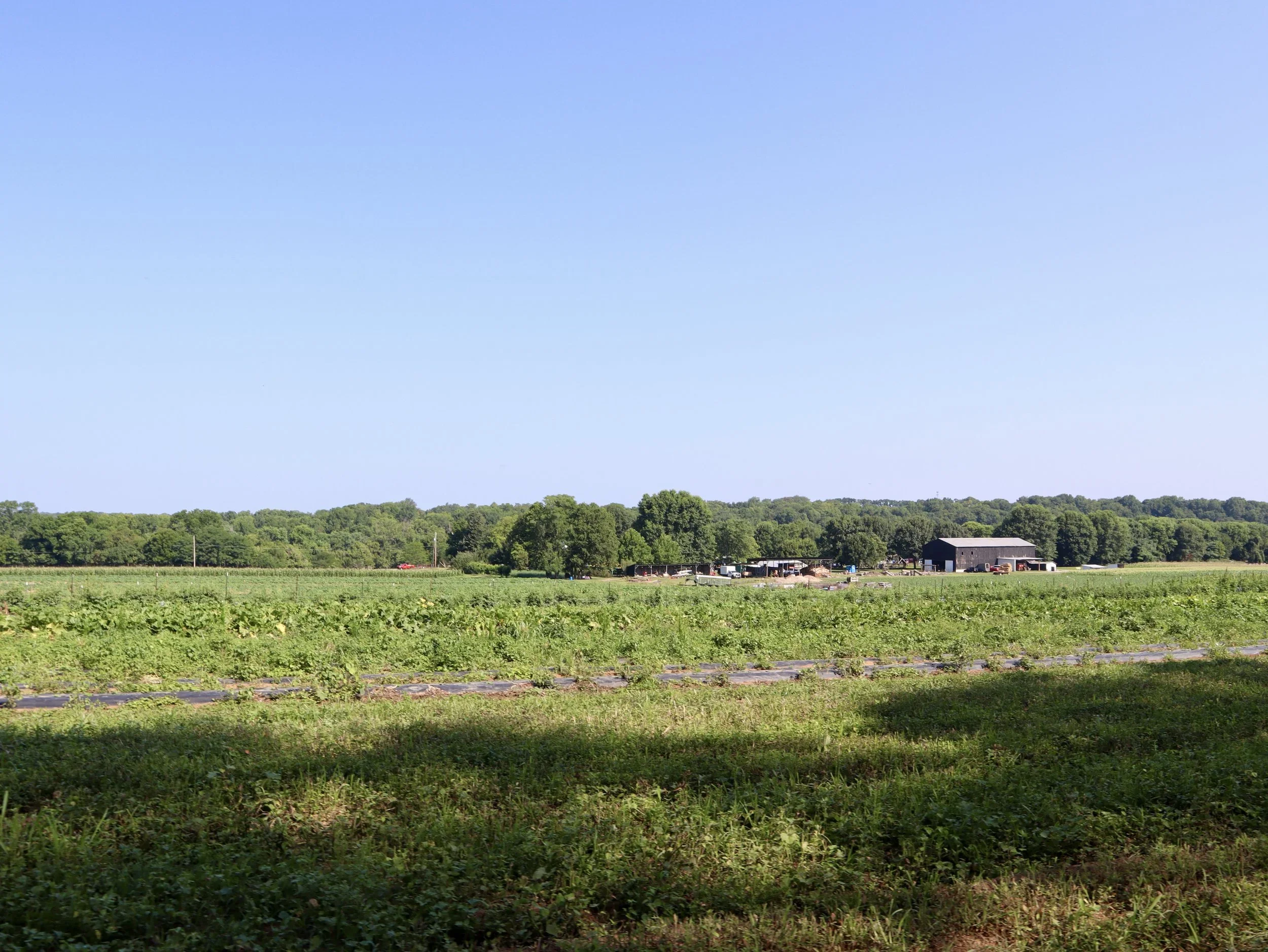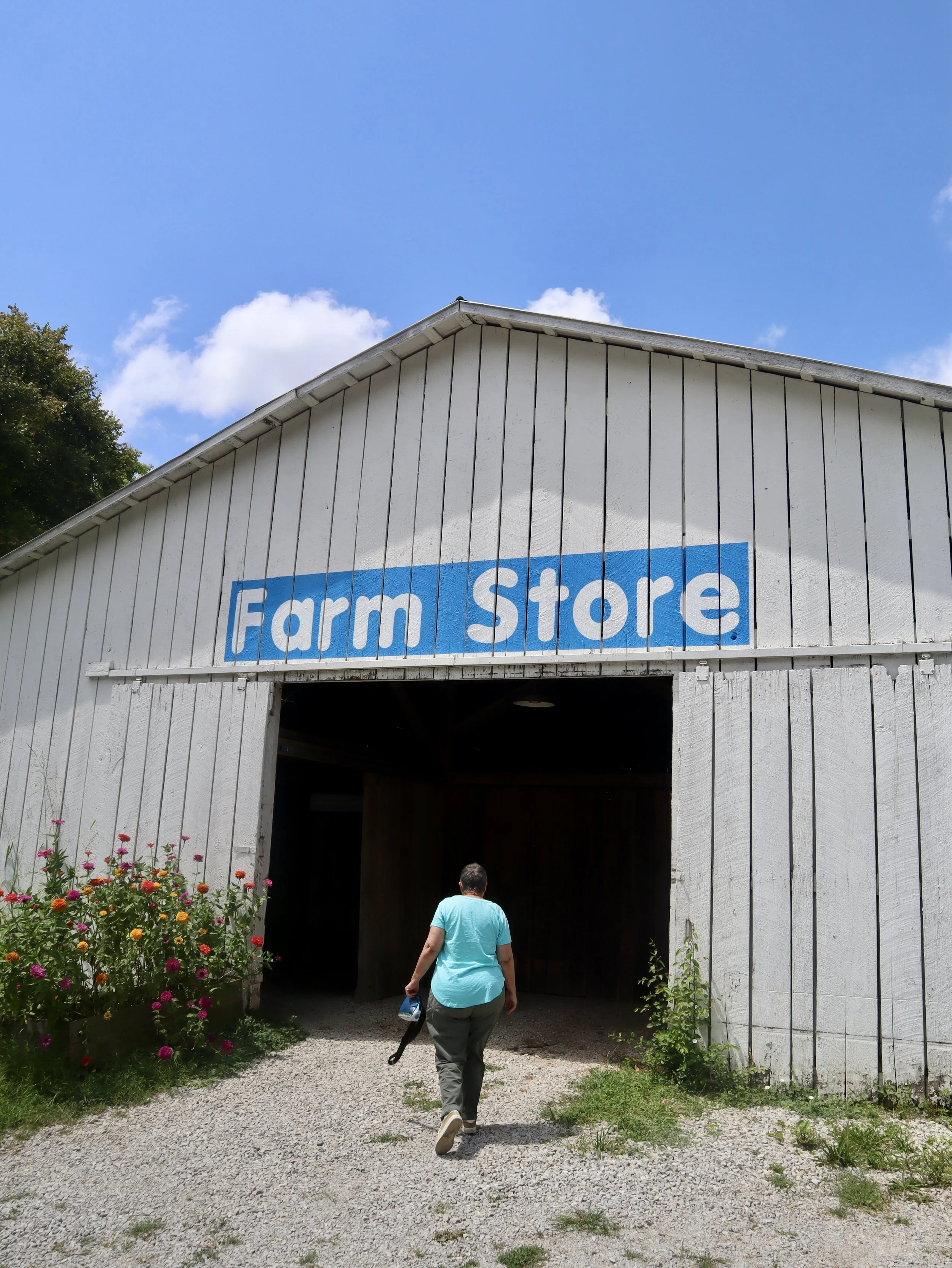Standing their Ground
story by Donna Hecker & photography by Talitha Schroeder
Who remembers farm stands? Long drives in the country in the back of your grandparents’ car, looking for the best peaches, tomatoes, green beans, and corn. Roadside signs, a Toledo scale and chalkboard prices, the padlocked wooden box with a slot on top to drop your dollars in.
We get asked all the time – who has the best _____; where can I buy _____; can you still get _____? The answers are all around us, and to prove it we mapped a 100-mile loop around Lexington, starting and ending at Holly Hill Inn in Midway. There are more ways than ever to put fresh food on your table; and just as many ways to meet the farmers who grew it.
We found serve-yourself stands, a pay-what-you-can table, a full-fledged store with reach-ins and display cases, and an urban market that sells bi-weekly food shares. Card readers and Venmo QR codes might perch alongside the cash box these days but the shelves are still full of newly harvested fruits and vegetables.
Our field trip started just down the road at Happy Jack’s Pumpkin Farm, which has been a go-to supplier for us as long as we can remember. Owned and operated by two generations (the third is growing fast!) of the Jones family, Happy Jack’s is a fixture at the Frankfort Farmers Market, but you can drive out to the farm any time between 3 and 6 pm, Monday-Saturday, and see what they picked that day. We love pulling up and seeing the big blackboard filled with orders from our Holly Hill restaurants.
Heading east-northeast from Happy Jacks, about 30 minutes away, is another longtime Holly Hill partner – Elmwood Stock Farm. Mac and Ann Bell Stone, and Ann Bell’s brother John Bell and his wife Melissa, own and operate Elmwood, which is an organic operation raising and selling produce, meats, and eggs. Elmwood’s customers can buy directly at the farm, from their farmers market booths, or online; and Elmwood was one of Kentucky’s first farms to offer CSA (community supported agriculture) shares.
Had we continued in that direction, we could have swung by Stepping Stone Farm and said hello to sisters-in-law Ally Vallandingham and Hanna Barnett who run an events space, playground, farm market and orchard, including u-pick; and sell to restaurants like us and local school districts, too. But Sharon Stone had invited us to come see her at the Woodhill International Market so that’s where we went next.
There’s a lot of talk in the food world today about building local food systems. And a lot of that discussion takes place in a pretty abstract setting. So it was great to see how a local food system plays out in real life at the Woodhill International Market, which is based in the Woodhill Community Center on Lexington’s Codell Dr.
We got there just in time to help Phaedra Spradlin unload a few flats of purple and red potatoes. Phaedra owns DreamTime Market Gardens, along with owner/grower Zach Selby. A few minutes later, Chelsea Barbour from High Five rolled in with cucumbers and eggplant, followed by Ryan Farneau who had coolers of Napa cabbage and containers of fresh herbs.
Chelsea grows produce on two acres of leased land in Woodford County and sells at the Frankfort Farmers Market every week. Ryan farms on two residential lots in downtown Lexington and sells vegetables and fermented goods at the Living Arts and Science Center. He describes his farm, named f-stop, as an urban micro-farm.
Phaedra’s, Chelsea’s and Ryan’s produce was added to a long line of plastic folding tables that were already loaded with tomatoes from Rootbound Farm (Oldham County), blueberries from Purplewood (Scott County) and red and white onions from Misty Thicket (Harrison County.)
Ranging from less than an acre to a couple hundred of acres, what all these farms have in common are multiple sales outlets and a diverse customer base. Some like DreamTime might only sell at their own farm stand or to chefs; others offer CSAs, work booths at farmers markets, and supply restaurants and schools.
And it all came together beautifully at Woodhill, where Sharon and a couple of volunteers filled bags for their bi-weekly food share buyers. Every other Friday, Woodhill posts a list of what will be available in the following week’s share and customers have until midnight Sunday to place an order. This system provides farmers with a dependable outlet for unsold or excess produce and gets fresh, healthy food into the hands (and bellies) of folks who might otherwise have trouble accessing it.
The price of each share ranges from $15-$40, depending on the customer’s ability to pay. About a third of the shares being bagged the day we were there had been purchased by the Community Response Coalition of Kentucky (CRCKY) which serves local immigrant families.
The Woodhill International Market was a great segue to our next stop – the pay-what-you-can table at Stonehedge Farm in southern Woodford County. Stonehedge runs a popular booth at the various Lexington Farmers Markets, and every Monday what hasn’t been sold is set out on a table for folks to pay what they can.
Adrienne Eggum, who owns Stonehedge with her husband Jim, says they started the table during Covid and it’s been a tradition ever since. Adrienne added goodie bags this year to give customers another option. Her Monday goodie bags go for $10 each and all the proceeds are paid to the farm crew as tips.
We made one last stop on our way back to Holly Hill Inn, at Maggie Dungan’s Salad Days farm stand. Maggie raises beautiful lettuces and other organic vegetables in southwestern Woodford County, just minutes from downtown Versailles. After you’ve shopped the reach-in stocked with neatly bagged veggies, jars of pickles and fresh herbs; scan the Venmo code or leave money in the cash box. Then if you’re feeling frisky enough to feed the resident goats, there’s a gumball machine full of dried corn for them.
It’s all proof that food systems don’t have to be abstract or complex, and each of us can be part of one. In the end, it comes down to farmers who stand their ground, and tend it, and harvest what comes from it; and people who want to eat good food, grown by someone they know. So the next time you’re out for a country drive, don’t pass up that farm stand. Stop and buy something, even if it’s just a jar of preserves, and leave a little something extra in the box. And if you’re lucky enough to meet the person who grew or made it, tell them thanks from the rest of us, too.
Related Content
10 Tips to a More Sustainable Kitchen
With help from Chef Ouita and Culinary Director Tyler McNabb, we’ve pulled together some creative ways you can integrate sustainability into your kitchen by reducing food waste, lowering energy consumption, and eating well.
© 2025, Holly Hill Inn/Ilex Summit, LLC and its affiliates, All Rights Reserved



















